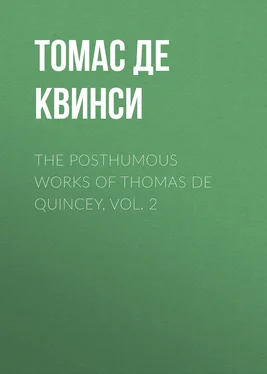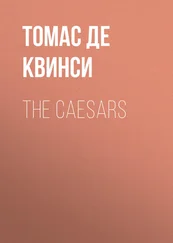Томас Де Квинси - The Posthumous Works of Thomas De Quincey, Vol. 2
Здесь есть возможность читать онлайн «Томас Де Квинси - The Posthumous Works of Thomas De Quincey, Vol. 2» — ознакомительный отрывок электронной книги совершенно бесплатно, а после прочтения отрывка купить полную версию. В некоторых случаях можно слушать аудио, скачать через торрент в формате fb2 и присутствует краткое содержание. Жанр: foreign_prose, literature_19, foreign_antique, на английском языке. Описание произведения, (предисловие) а так же отзывы посетителей доступны на портале библиотеки ЛибКат.
- Название:The Posthumous Works of Thomas De Quincey, Vol. 2
- Автор:
- Жанр:
- Год:неизвестен
- ISBN:нет данных
- Рейтинг книги:3 / 5. Голосов: 1
-
Избранное:Добавить в избранное
- Отзывы:
-
Ваша оценка:
- 60
- 1
- 2
- 3
- 4
- 5
The Posthumous Works of Thomas De Quincey, Vol. 2: краткое содержание, описание и аннотация
Предлагаем к чтению аннотацию, описание, краткое содержание или предисловие (зависит от того, что написал сам автор книги «The Posthumous Works of Thomas De Quincey, Vol. 2»). Если вы не нашли необходимую информацию о книге — напишите в комментариях, мы постараемся отыскать её.
The Posthumous Works of Thomas De Quincey, Vol. 2 — читать онлайн ознакомительный отрывок
Ниже представлен текст книги, разбитый по страницам. Система сохранения места последней прочитанной страницы, позволяет с удобством читать онлайн бесплатно книгу «The Posthumous Works of Thomas De Quincey, Vol. 2», без необходимости каждый раз заново искать на чём Вы остановились. Поставьте закладку, и сможете в любой момент перейти на страницу, на которой закончили чтение.
Интервал:
Закладка:
Voltaire admired the line itself, but in deference to this Greek irony, supported by the steady advice of his English friends, he finally altered it. It is possible to fail, however, as an epic poet, and very excusable for a Frenchman to fail, and yet to succeed in many other walks of literature. But to Coleridge's piety, to Coleridge's earnest seeking for light, and to Coleridge's profound sense of the necessity which connects from below all ultimate philosophy with religion, the scoffing scepticism of Voltaire would form even a stronger repulsion than his puerile hostility to Shakespeare. Even here, however, there is something to be pleaded for Voltaire. Much of his irreligion doubtless arose from a defective and unimpassioned nature, but part of it was noble, and rested upon his intolerance of cruelty, of bigotry, and of priestcraft—but still more of these qualities not germinating spontaneously, but assumed fraudulently as masques. But very little Coleridge had troubled himself to investigate Voltaire's views, even where he was supposing himself to be ranged in opposition to them.
A word or two about those accusations of plagiarism of which far too much has been made by more than one critic; we ourselves having, perhaps, been guilty of too wantonly stirring these waters at one time of our lives; and in the attempt to make matters more clear, only, it may be, succeeded in muddying them. Stolberg, Matthison, Schiller, Frederika Brun, Schelling, and others, whom he has been supposed to have robbed of trifles, he could not expect to lurk 8 8 It is true that Mr. De Quincey did make the mistake of supposing Coleridge to have 'calculated on' a remark which Mrs. Coleridge justly characterises as a blind one. It was blind as compared with the fact resulting from grounds not then known; else it was not blind as a reasonable inference under the same circumstances.
in darkness, and particularly as he was actively contributing to disperse the darkness that yet hung over their names in England. But really for such bagatelles as were concerned in this poetic part of the allegation—even Bow Street, with the bloodiest Draco of a critical reviewer sitting on the bench, would not have entertained the charge. Most of us, we suppose, would be ready enough to run off with a Titian or a Correggio, provided the coast were clear, and no policemen heaving in sight; but to be suspected of pocketing a silver spoon, which, after all, would probably turn out to be made of German silver—faugh!—we not only defy the fiend and his temptations generally, but we spit in his face for such an insinuation. With respect to the pretty toy model of Hexameter and Pentameter from Schiller, we believe the case to have arisen thus: in talking of metre, and illustrating it (as Coleridge often did at tea-tables) from Homer, and then from the innumerable wooden and cast-iron imitations of it among the Germans—he would be very likely to cite this little ivory bijou from Schiller; upon which the young ladies would say: 'But, Mr. Coleridge, we do not understand German. Could you not give us an idea of it in some English version?' Then would he, with his usual obligingness, write down his mimic English echo of Schiller's German echo. And of course the young ladies, too happy to possess an autograph from the 'Ancient Mariner,' and an autograph besides having a separate interest of its own, would endorse it with the immortal initials 'S. T. C.,' after which an injunction issuing from the Court of Chancery would be quite unavailing to arrest its flight through the journals of the land as the avowed composition of Coleridge. They know little of Coleridge's habits who suppose that his attention was disposable for cases of this kind. Alike, whether he were unconsciously made by the error of a reporter to rob others, or others to rob him, he would be little likely to hear of the mistake—or, hearing of it by some rare accident, to take any pains for its correction. It is probable that such mistakes sometimes arose with others, but sometimes also with himself from imperfect recollection; and that , owing chiefly to his carelessness about the property at issue, so that it seemed not worth the requisite effort to vindicate the claim if it happened to be his , or formally to renounce it if it were not. But, however this might be, his daughter's remark remains true, and is tolerably significant, that the people whom (through anybody's mistake) he seems to have robbed were all pretty much in the sunshine of the world's regard; there was no attempt to benefit by darkness or twilight, and an intentional robber must have known that the detection was inevitable.
A second thing to be said in palliation of such plagiarisms, real or fancied, intentional or not intentional, is this—that at least Coleridge never insulted or derided those upon whose rights he is supposed to have meditated an aggression.
Coleridge has now been dead for more than fifteen years, 9 9 If for the words 'more than fifteen years' we say sixteen or seventeen, as Coleridge died in 1834, this article would be written in 1850 or 1851.—Ed.
and he lived through a painful life of sixty-three years; seventy-eight years it is since he first drew that troubled air of earth, from which with such bitter loathing he rose as a phœnix might be supposed to rise, that, in retribution of some treason to his immortal race, had been compelled for a secular period to banquet on carrion with ghouls, or on the spoils of vivisection with vampires. Not with less horror of retrospect than such a phœnix did Coleridge, when ready to wing his flight from earth, survey the chambers of suffering through which he had trod his way from childhood to gray hairs. Perhaps amongst all the populous nations of the grave not one was ever laid there, through whose bones so mighty a thrill of shuddering anguish would creep, if by an audible whisper the sound of earth and the memories of earth could reach his coffin. Yet why? Was he not himself a child of earth? Yes, and by too strong a link: that it was which shattered him. For also he was a child of Paradise, and in the struggle between two natures he could not support himself erect. That dreadful conflict it was which supplanted his footing. Had he been gross, fleshly, sensual, being so framed for voluptuous enjoyment, he would have sunk away silently (as millions sink) through carnal wrecks into carnal ruin. He would have been mentioned oftentimes with a sigh of regret as that youthful author who had enriched the literature of his country with two exquisite poems, 'Love' and the 'Ancient Mariner,' but who for some unknown reason had not fulfilled his apparent mission on earth. As it was, being most genial and by his physical impulses most luxurious; yet, on the other hand, by fiery aspirations of intellect and of spiritual heart being coerced as if through torments of magical spells into rising heavenwards for ever, into eternal commerce with the grander regions of his own nature, he found this strife too much for his daily peace, too imperfect was the ally which he found in his will; treachery there was in his own nature, and almost by a necessity he yielded to the dark temptations of opium. That 'graspless hand,' from which, as already in one of his early poems (November, 1794) he had complained—
'Drop friendship's priceless pearls as hour-glass sands,'
was made much more graspless, and in this way the very graces of his moral nature ministered eventually the heaviest of his curses. Most unworldly he was, most unmercenary, and (as somebody has remarked) even to a disease, and, in such a degree as if an organ had been forgotten by Nature in his composition, disregardful of self. But even in these qualities lay the baits for his worldly ruin, which subsequently caused or allowed so much of his misery. Partly from the introversion of his mind, and its habitual sleep of reverie in relation to all external interests, partly from his defect in all habits of prudential forecasting, resting his head always on the pillow of the present —he had been carried rapidly past all openings that offered towards the creation of a fortune before he even heard of them, and he first awoke to the knowledge that such openings had ever existed when he looked back upon them from a distance, and found them already irrecoverable for ever.
Читать дальшеИнтервал:
Закладка:
Похожие книги на «The Posthumous Works of Thomas De Quincey, Vol. 2»
Представляем Вашему вниманию похожие книги на «The Posthumous Works of Thomas De Quincey, Vol. 2» списком для выбора. Мы отобрали схожую по названию и смыслу литературу в надежде предоставить читателям больше вариантов отыскать новые, интересные, ещё непрочитанные произведения.
Обсуждение, отзывы о книге «The Posthumous Works of Thomas De Quincey, Vol. 2» и просто собственные мнения читателей. Оставьте ваши комментарии, напишите, что Вы думаете о произведении, его смысле или главных героях. Укажите что конкретно понравилось, а что нет, и почему Вы так считаете.











